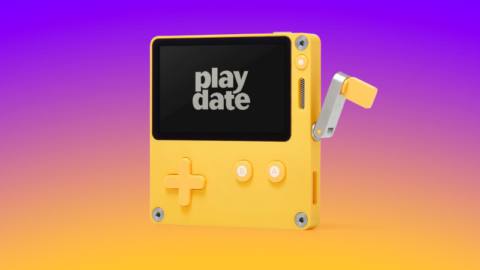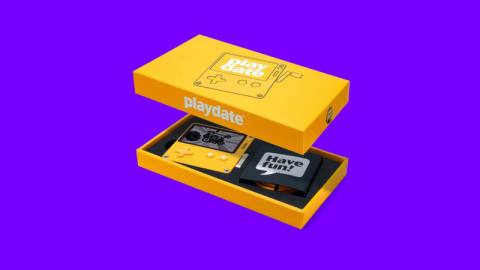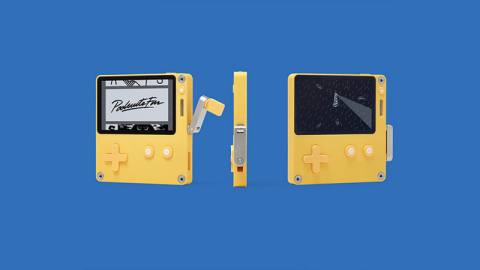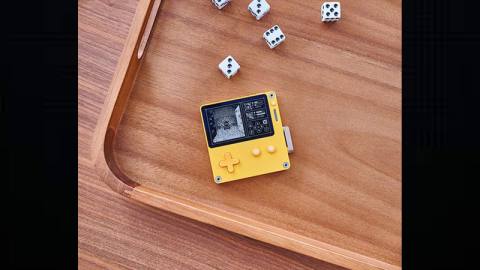
In an era of 4K visuals, 3D spatial audio, and sprawling open-world designs, there’s something oddly refreshing about a new handheld device trying to emulate the earliest Game Boy and Game & Watch experiences. Playdate is a retro-inspired indie handheld built entirely to deliver novel experiences in a pocket-friendly format. From its bright and friendly appearance to its often whimsical games, it’s clear the Playdate’s name was chosen with purpose. Like a meet-up between childhood friends, this is an experience meant to recall youth and simplicity. It aims to delight those who pick it up through an array of small, entertaining activities.
The Playdate makes an excellent first impression. The charming yellow handheld may be tiny, but it feels solid in hand. The buttons feel clicky and responsive, and the side crank (the system’s most significant innovation) is satisfying to twist round and round. The included speakers are crisp, clear, and capable of robust volume for their size. Or you can plug your preferred headset into the included jack. The small reflective black and white screen nails the nostalgic vibe it’s going for, instantly calling to mind those first successful handheld games that older players may remember from youth.

However, the small screen and absence of backlighting are also Playdate’s biggest failures. While it might offer a throwback experience, I don’t think I’ve ever found myself missing those heady days of eye discomfort from trying to read minuscule text or constantly tilting my device to catch the best light. The Playdate must contend with both problems. In bright outdoor sunlight, the Playdate is at its best. But in indoor settings or later in the day outside, a nearby direct light source is nearly essential. Even with excellent vision, I needed regular breaks from play to prevent significant eye strain.
The user interface is straightforward when it needs to be in menus and setup scenarios but playful when it can be. A seemingly eager-to-please robotic buddy handles an intro and the subsequent navigation to individual games. Its eyes gleefully open as you double-tap the button to wake the machine up. As new games arrive in your library, they show up as wrapped presents, and the robot pulls open the ribbon to reveal the new arrival.

The games in question are delivered via download on a WiFi connection, and the initial launch includes full access to all 24 games in the first season. This naming convention certainly implies future expansion. But even ahead of the implied later seasons, the device is especially creator-friendly. It fully supports the sideloading of new games through an easy-to-manage process; the review package included the option to sideload an enjoyable game called Bloom, about running a flower shop. While I didn’t have the expertise to build anything worthwhile myself, the Playdate’s SDK is free to download, so enterprising programmers should have few barriers to creating something unique.
Playdate’s developer, Panic Inc., has brought aboard an eclectic group of indie game creators for its initial catalog. The mostly bite-sized projects represent an impressively curated mix of genres and game styles. Many of these games use the analog crank as an input method, whether for something simple like advancing text or an actual navigation tool for movement and action. I like the novelty, but I’m not yet sold on the crank as far as its utility for precise controls.

By their nature, the included games arrive in small batches in the days after your Playdate purchase arrives, a clear expression that Playdate is meant to be experienced as a gradual unearthing of fun. It would be a shame to spoil too much about the individual experiences. Every player is likely to be attracted to different games. The most rewarding were games that embraced simplicity and throwback designs, albeit with some clever modern twists.
Spellcorked has players stirring up reagents to make magic potions with a crank twist. Battleship Godius is a variation on 2D space shooters, but with a crank to rewind time when things go wrong. Executive Golf DX has you shooting a golf ball up the proverbial corporate ladder, with desks and copy machines as obstacles. Not every game clicked for me, but that’s sort of the point; each of these small concept games is an experiment likely only to capture the attention of certain players. But the joy of discovering these unknown projects is easily half the fun. If you come out with several favorites on the other side, all the better.
B- The Verdict
The charm and nostalgia of the black and white screen wear off after a time, and poor lighting can ruin the fun. But strong battery life (rechargeable via USB-C plug-in), sturdy construction, and a good opening slate of games are reasons to jump on the Playdate bandwagon. Even if not all the initial games are winners, they’re all surprising and will make you smile. Release
April 18 Price
$179 More Information
play.date Source
